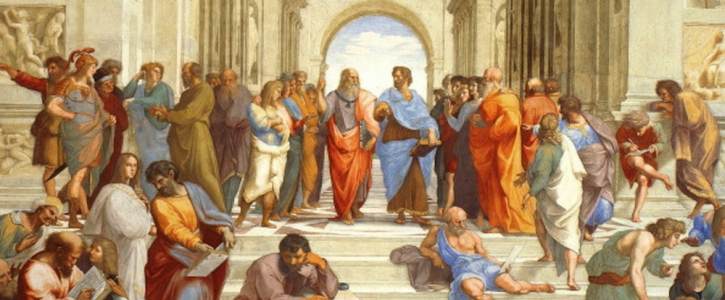A fascinating sentence appears at the end of Genesis chapter four in the Hebrew Bible. After recording the birth of Enosh, Adam’s grandson by Seth, we read that “At that time people began to call on the name of the Lord” (Gen 4:26b). Presumably this refers to prayer. What were people doing before this change? What thoughts might they have had about ultimate reality? What religious practices did they engage in? What motivated and gave shape to their prayers? They were clearly acting in response to theological convictions, desires or fears.
The notion of “theology,” and by implication “theologians,” originated in various preliterate cultures in the ancient world. The experience of ancient Hebrew people is one example. Early Greek poets such as Homer and Hesiod were called theologians. Likewise for what we know as the Dreaming of ancient indigenous communities in Australia. The Jewish philosopher Philo (c.20 BCE – c.50 CE) called Moses a theologos (one who speaks for/of God), although no form of the Greek word appears in the Septuagint or the Old or New Testaments.
An early written instance of the term “theology” occurs in Plato’s Republic (Book II), where Plato (c427-347 BCE) posits God as the origin of everything, and imagines God as complete, unchanging, perfect and good – thereby turning traditional Greek mythology and folklore on its head. Plato’s student Aristotle (384-322 BCE) tends to dismiss theology altogether as mythic speech about the gods, inferior to philosophy – a theological statement in its own right.
Neither Plato nor Aristotle, nor any ancient philosophers, priests, kings or ordinary people, arrived at their ideas about religion and myth in a vacuum. Nor did they simply expand on received notions. Indeed, throughout antiquity,
from Xenophanes to the late Neoplatonists, philosophers kept formulating their views about the nature of the divine, and these views always meant a vast departure from the traditional representations of the gods, and often incorporated a criticism of traditional religious attitudes … the philosophers’ attitude towards traditional religiosity was a mixture of innovation, criticism, and conservatism … [they] most often presented their radical views as mere amendments, conceptual clarifications, or even as a return to a more ancient tradition.
It was Christians who, between about 100 and 200 CE, appropriated the term “theology” to describe their regular activity of reasoned discourse about the God who was revealed in their Scriptures. The Christian theologian Athanasius (c.296-373), for example, applies theologia to knowledge of God in God’s own being, as distinct from God’s dealings with the world.
Others, such as Augustine of Hippo (354-430), reserve the term for teaching about the Godhead. Theology as we know it today, as a more or less systematic academic practice, developed with the medieval scholastic writers and the new universities of Europe. Thomas Aquinas, for example, held that “theology is taught by God, teaches of God, and leads to God,” and shaped his life’s work around that belief.
Yet, as Reformed theologian Shirley C. Guthrie observes in his classic systematic theology, “No theology is interested only in God. The study of theology is by definition the quest for the ultimate truth about God, about ourselves, and about the world we live in.”
Stan Grenz and Roger Olson similarly observe that “good theology moves beyond stating truths; it explores the significance of our beliefs or faith assertions for all of life, … [providing] Christians with needed direction as they seek to live as Christ’s disciples.”
Grenz and Olson also argue that theology is not a kind of esoteric knowledge possessed by a few superior intellectuals, but is simply faith seeking understanding. Whenever and wherever anyone possesses faith, variously defined, and seeks to understand its basis and structure, they are doing theology. Indeed, as I noted in a previous post, they are theologians.
Today we often use the term “theology” to refer to a range of academic disciplines in a university or seminary course, such as biblical languages, biblical theology, systematic theology, church history, homiletic, and such like. But I think it’s good to reflect the long and winding path we have taken to get to where we are, and to express gratitude and wonder for those who have laboured to light the path for us.
Rod Benson is an ordained Baptist minister employed as Research Support Officer at Moore College, Sydney. This article first appeared on his blog, The Theology Whisperer. You can read the original post here.













